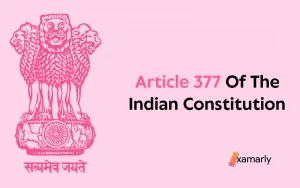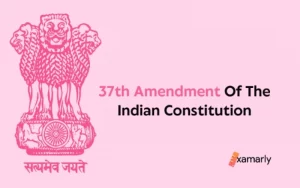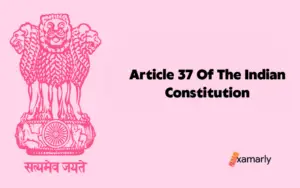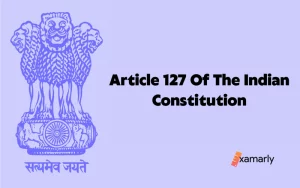The writ of habeas corpus in India is a fundamental right and it can be issued by the High Court or the Supreme Court. It is the first of the 5 main types of writs in India.
It is an important safeguard against arbitrary & unlawful detention and violation of personal liberty under Constitutional Rights.
In this article, we’ll dive deep to get a thorough understanding of the writ of habeas corpus in India.
- What Is The Writ Of Habeas Corpus In India?
- Writ Of Habeas Corpus – Origin
- Writ Of Habeas Corpus In India – Meaning
- Writ Of Habeas Corpus In India – Nature
- Writ Of Habeas Corpus In India – Features
- Who Can Apply For The Writ Of Habeas Corpus In India?
- When Is The Writ Of Habeas Corpus In India Refused?
- Procedure For Filing A Habeas Corpus In India
- Writ Of Habeas Corpus In India – Remedies
- Writ Of Habeas Corpus In India – Misuses
- Cases Related To The Writ Of Habeas Corpus In India
- Summary
- FAQs About The Writ of Habeas Corpus In India
- What is the writ of habeas corpus in India?
- Who can apply for the writ of habeas corpus in India?
- When is the writ of habeas corpus in India refused?
- What are the features of the writ of habeas corpus in India?
- What are the remedies under the writ of habeas corpus in India?
- What is the procedure for filing a writ of habeas corpus in India?
What Is The Writ Of Habeas Corpus In India?
Habeas corpus in India is a legal writ/order used to bring a person, before a court/judge, who is being detained or imprisoned, within the court’s territorial jurisdiction.
The purpose of habeas corpus is to protect an individual’s personal liberty and to ensure the government has a valid reason for detaining them.
The writ of habeas corpus in India is provided for under Article 226 of the Constitution.
Writ Of Habeas Corpus – Origin
The term “habeas corpus” originates from the Latin language, and means “that you have the body.”
The origin of habeas corpus can be traced back to medieval England, where it was used as a means of protecting the individual from arbitrary detention by the state.
The right to habeas corpus was first codified in the Magna Carta of 1215 and was later included in the English Bill of Rights of 1689.
The principle of habeas corpus is widely recognised as a fundamental right to personal liberty and is protected by many national constitutions and international human rights instruments.
Writ Of Habeas Corpus In India – Meaning
The writ of habeas corpus in India is a powerful legal tool that can be used to challenge the legality of detention or imprisonment, and it can also be used to ensure that a person who is being detained is being treated humanely and with dignity.
The writ of habeas corpus can be used to challenge unlawful detention in a variety of circumstances, including:-
- Detention by the government,
- Detention in prison,
- Detention in a mental institution, and
- Detention in immigration detention centres.
Writ Of Habeas Corpus In India – Nature
The nature of the writ of habeas corpus is that it is a judicial remedy that allows an individual to challenge their detention and request for release.
It is a means to ensure that the individual’s rights are being protected and that they are not being held in detention without legal justification.
The writ of habeas corpus is a powerful tool for protecting individual liberties and human rights, as it allows individuals to challenge the actions of the state and to seek redress for any violations of their rights.
It is a legal process for judicial review that is usually invoked to challenge judicial authority when other remedies have failed or are not available.
The writ of habeas corpus may not be available in certain circumstances, such as during a state of:
- Emergency, or
- Martial law,
when certain rights and legal procedures may be suspended.
Writ Of Habeas Corpus In India – Features
Enlisted are the features of the writ of habeas corpus in India:-
- Used to bring a person who is being detained or imprisoned before a court or judge.
- Challenges the illegal detention and ensures that the individual’s rights are being protected.
- Fundamental right protected by many national constitutions and international human rights instruments.
- Judicial remedy that allows an individual to request for release.
- Protects individual liberties and human rights by allowing individuals to challenge the actions of the state and seek redress for any violations of their rights.
- Legal process that can be invoked when other remedies have failed or are not available.
- Challenges illegal detention in a variety of circumstances, including detention by the government, detention in prison, detention in a mental institution, and detention in immigration detention centres.
- Ensures that an individual’s rights are not being violated and that they are not being held in detention without legal justification.
Who Can Apply For The Writ Of Habeas Corpus In India?
The writ of habeas corpus in India, is typically available to individuals who are being detained or imprisoned.
This includes individuals who are:
- being held in custody by the government,
- serving a prison sentence,
- being held in a mental institution, and
- detained in immigration detention centres.
The writ petition can be filed by the individual themselves, or by a third party on their behalf, such as a family member, lawyer, or other legal representative.
In some cases, the court may also initiate the writ on its own motion, if it becomes aware of an individual being held in detention without legal justification.
Additionally, some countries may have their own specific laws and regulations regarding the writ petition of habeas corpus and who can apply for it.
When Is The Writ Of Habeas Corpus In India Refused?
The writ/writ petition of habeas corpus in India can be refused in certain circumstances.
Some examples include:
- When the individual is being held in lawful detention: If the individual is being detained or imprisoned for a valid reason and their detention is in accordance with the law, the writ may be refused.
- When the individual has exhausted other legal remedies: If the individual has already pursued other legal remedies and they have been unsuccessful, the court may refuse the writ of habeas corpus.
- When the individual’s detention is authorised by a judicial order: If the individual’s detention has been authorised by a court or judge, the writ may be refused.
- When the detention is during a state of emergency or martial law: In certain circumstances, such as during a state of emergency or martial law, certain rights and legal procedures may be suspended, and the writ of habeas corpus may not be available.
- When the individual is in detention by foreign authorities: In some cases, the writ of habeas corpus may be refused if the individual is being held by foreign authorities and the jurisdiction of the court does not extend to the foreign country.
It is important to note that each country may have their own specific laws and regulations regarding when the writ of habeas corpus can be refused, and this list may not be exhaustive.
Procedure For Filing A Habeas Corpus In India
The procedure for filing a writ of habeas corpus in India, can vary depending on the jurisdiction and the specific circumstances of the case.
However, some common steps in the process include:
- Filing a writ petition: The individual or their legal representative will typically file a petition with the court, outlining the grounds on which they are challenging their detention and requesting relief in the form of release or other remedies.
- Service of the writ petition: The petition must be served on the government authority responsible for the individual’s detention, such as a prison warden or immigration official, so that they can respond to the allegations made in the petition.
- Government’s response: The government will typically file a response to the petition, outlining the grounds on which the individual is being detained and providing any supporting evidence.
- Hearing: The court will typically hold a hearing to consider the petition and the government’s response. Both sides will have the opportunity to present evidence and argument.
- Decision: After considering the evidence and argument, the court will make a decision on the petition, either granting the writ of habeas corpus and ordering the individual’s release, or denying the writ and upholding the individual’s detention.
Additionally, the court may also order for an investigation or a medical examination of the individual if required.
Writ Of Habeas Corpus In India – Remedies
The writ of habeas corpus in India provides a number of remedies to individuals who are being detained or imprisoned without legal justification.
Some of the remedies available under the writ of habeas corpus in India include:
- Release from detention: The writ of habeas corpus can be used to challenge the legality of detention and request release from detention if the detention is found to be unlawful.
- Bail: The writ of habeas corpus can be used to request bail if the individual is being held in detention pending trial.
- Production of the person before the court: The writ of habeas corpus can be used to request the production of the individual before the court for the purpose of examination of the legality of detention.
- Medical examination: The writ of habeas corpus can be used to request a medical examination of the individual if there are concerns about their health or welfare while in detention.
- Compensation: In cases of wrongful detention or maltreatment, the writ of habeas corpus can be used to request compensation for damages suffered as a result of the detention.
- Punishment of officials who are responsible for illegal detention.
It is important to note that the specific remedies available may vary depending on the jurisdiction and the specific circumstances of the case.
Additionally, the writ of habeas corpus provides a means for an individual to challenge their detention, but it is not the only remedy available to them, they can also use other legal remedies like writ of mandamus, certiorari, quo warranto etc.
Writ Of Habeas Corpus In India – Misuses
The writ of habeas corpus in India, has been misused in the past by the government to justify arbitrary detention and silence political opponents.
One example of this is during the 1975-1977 period, known as the “Emergency” period, when the government suspended the writ of habeas corpus and used it to detain thousands of political opponents, activists, and dissenters without trial.
The government also used preventive detention laws to detain individuals without trial, and the writ of habeas corpus was not available as a means to challenge these detentions.
Another example is the use of the Unlawful Activities (Prevention) Act (UAPA) to detain individuals without trial and under this act, the writ of habeas corpus is not available as a means to challenge detention.
Additionally, there have been instances of the misuse of the writ of habeas corpus in India by the government to silence political opponents, such as the arbitrary arrest of individuals who have criticised the government or its policies.
It is worth noting that although there have been instances of misuse of the writ of habeas corpus, India has a robust system of checks and balances in place to prevent such misuse and the judiciary has played an active role in ensuring the protection of individual rights, even during the period of Emergency.
Cases Related To The Writ Of Habeas Corpus In India
Following are some important cases & judgements with regards to the writ of habeas corpus in India:-
- ADM Jabalpur v. Shivakant Shukla (1976): This case dealt with the suspension of habeas corpus during the Emergency declared by the Government of India in 1975. The court ruled that the suspension of habeas corpus was valid, and that individuals detained during the Emergency did not have the right to challenge their detention in court.
- Hussainara Khatoon v. State of Bihar (1980): This case dealt with the detention of individuals under the Bihar Maintenance of Public Order Act, and established the principle that an individual’s detention must be reviewed by a court within a reasonable period of time.
- Sunil Batra v. Delhi Administration (1978): This case dealt with the rights of prisoners and established the principle that individuals in prison have the right to access the courts through the writ of habeas corpus. The Supreme Court has also clarified that the writ of habeas corpus can be utilised not only to challenge illegal arrest of a prisoner, but also to safeguard them from maltreatment or inhumane treatment by the authorities who are holding them in custody.
- Suk Das v. Union Territory of Arunachal Pradesh (1986): This case dealt with the rights of individuals detained in the northeastern state of Arunachal Pradesh and established the principle that individuals in remote areas have the same rights to habeas corpus as those in urban areas.
- In the case of Kanu Sanyal v. District Magistrate Darjeeling & Ors. (1974 AIR 510), the Supreme Court decided that the emphasis should not be on the usual understanding of Habeas Corpus, which is to present the body, but rather on evaluating the legality of the detention by looking into the details and specifics of the case. It was stated that the writ of habeas corpus is a writ that deals with procedures and not with the substance of rights. This case was about the character & scope of habeas corpus.
- A.K. Gopalan v. The State of Madras: In this case, the constitutionality of the preventive detention act was examined. If a legislature restrains a person from their personal liberty, it should be legally authorized to do so. If the law supporting the detention is unlawful, the detention itself is also deemed unlawful. Individuals have the right to seek relief from the court, and can appeal to the Supreme Court against the decision of the High Court regarding the grant or denial of a writ of habeas corpus.
- Sheela Barse v. State of Maharashtra 1983 SCC 96: In this case, a letter was sent to the Supreme Court regarding the treatment of women prisoners who were allegedly assaulted in the lockup. A writ petition was filed by a human rights activist on their behalf. The petitioner’s claims and the current circumstances will be investigated by an authority that the court established.It was found that the allegations were true. The court rejected the idea of “locus standi,” holding that if a person who is being held or imprisoned is unable to submit an application for the writ, another person may do so on their behalf (standing to sue).
- Nilabati Behra v. The State of Orissa: This case dealt with the son of the petitioner taken away by the police officers of the Orissa police for questioning and despite attempts to locate him, they were unsuccessful. As a result, a writ petition for habeas corpus was filed in court. During the legal action, the son’s body was found on a railway track. The petitioner was given compensation of INR 1,50,000.
Summary
The writ of Habeas Corpus is a powerful tool for protecting individual liberties and human rights by allowing individuals to challenge the actions of the state and seek redress for any violations of their rights.
It helps in challenging illegal detentions & ensuring protection of fundamental rights.
You Might Also Like To Read:
- Article 32 Of The Indian Constitution.
- Article 21 Of The Indian Constitution.
- Types Of Writs In India.
FAQs About The Writ of Habeas Corpus In India
What is the writ of habeas corpus in India?
The writ of habeas corpus is a legal action or writ that is used to bring a person who is being detained or imprisoned before a court or judge to challenge the legality of their detention.
Who can apply for the writ of habeas corpus in India?
The writ of habeas corpus is typically available to individuals who are being detained or imprisoned.
This includes individuals who are being held in custody by the government, those who are serving a prison sentence, those who are being held in a mental institution, and those who are being detained in immigration detention centres.
When is the writ of habeas corpus in India refused?
The writ of habeas corpus can be refused in certain circumstances such as when the individual is being held in lawful detention, when the individual has exhausted other legal remedies, when the individual’s detention is authorised by a judicial order and when the detention is during a state of emergency or martial law.
What are the features of the writ of habeas corpus in India?
The writ of habeas corpus is considered a fundamental right, a powerful tool for protecting individual liberties and human rights, it can be used to challenge detention in a variety of circumstances and it can be invoked when other remedies have failed or are not available.
What are the remedies under the writ of habeas corpus in India?
The writ of habeas corpus provides a number of remedies to individuals who are being detained or imprisoned without legal justification, some of the remedies include release from detention, bail, production of the person before the court, medical examination, compensation, and punishment of officials who are responsible for illegal detention.
What is the procedure for filing a writ of habeas corpus in India?
The procedure for filing a writ of habeas corpus can vary depending on the jurisdiction and the specific circumstances of the case, but some common steps include filing a petition, service of the petition, government’s response, hearing, and decision.






